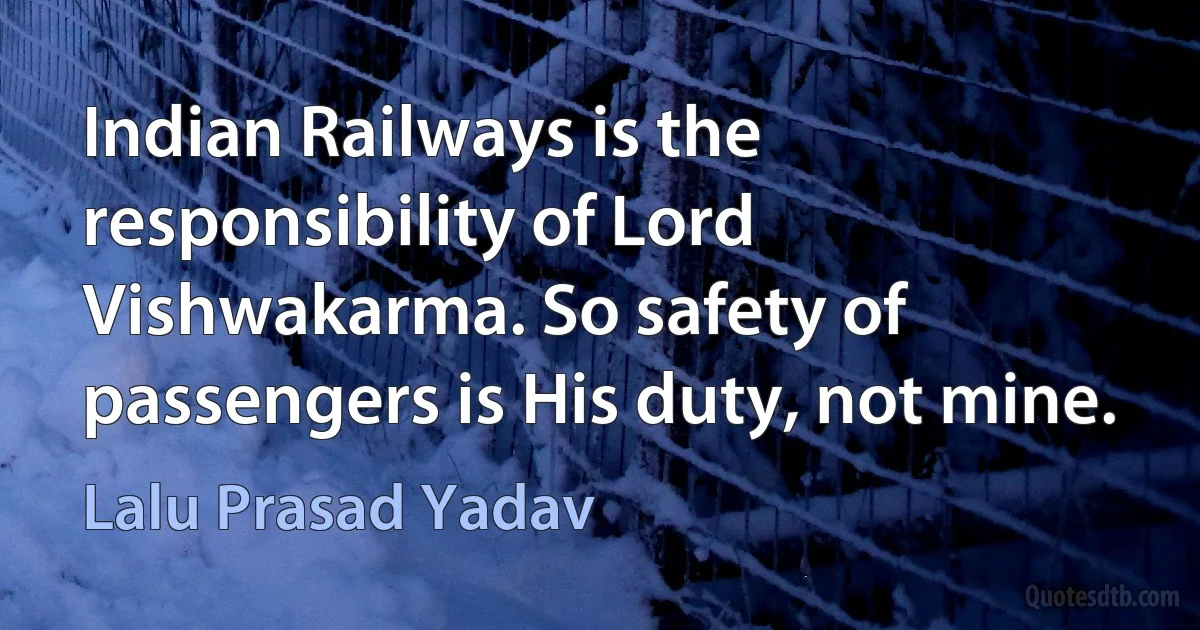Indian Quotes - page 43
If you awaken from this illusion, and you understand that black implies white, self implies other, life implies death-or shall I say, death implies life-you can conceive yourself. Not conceive, but feel yourself, not as a stranger in the world, not as someone here on sufferance, on probation, not as something that has arrived here by fluke, but you can begin to feel your own existence as absolutely fundamental. What you are basically, deep, deep down, far, far in, is simply the fabric and structure of existence itself. So, say in Hindu mythology, they say that the world is the drama of God. God is not something in Hindu mythology with a white beard that sits on a throne, that has royal perogatives. God in Indian mythology is the self, Satcitananda. Which means sat, that which is, chit, that which is consciousness; that which is ananda is bliss. In other words, what exists, reality itself is gorgeous, it is the fullness of total joy.

Alan Watts
I love our old Chuang-tzu
because I love his pantheism,
because he got a living by making straw shoes.
I love the Dutchman Spinoza
because I love his pantheism,
because he got a living by grinding lenses.
I love the Indian Kabir
because I love his pantheism,
because he got a living by knotting fishing-nets.

Baruch Spinoza
You compare Cardozo with Spinoza; but as far as I can judge by your book there is no intellectual comparison. Spinoza was not soft. I have been all my life long a fervent disciple of Spinoza precisely on account of his firmness, of his uncompromising naturalism. Yet even he leaves out the three traditions which, however false their cosmology, seem to me morally sound: the Greek, the Catholic, and the Indian. I am therefore not a disciple of Spinoza in his ideal of human life: It leaves out poetry, art, traditional religion, military and constructive patriotism. His society would be a tame society, where there would be no masters, but all would be voluntary slaves. Perhaps you feel something of my difficulty when you point out that "art" is an indispensable ingredient in everything human.

Baruch Spinoza
It is there that our leaders prefer a surrender to the British than to the peasantry. Can you point out any effort to organize the peasants or the labourers? No, they will not run the risk. There they lack. That is why I say they never meant a complete revolution. Through economic and administrative pressure they hoped to get a few more reforms, a few more concessions for the Indian capitalists.

Bhagat Singh
The Puritans in New England were not immediately presented with an Indian problem, for diseases introduced earlier by trading ships along the coast had badly decimated the Indian population. Yet when the Pequots resisted the migration of settlers into the Connecticut Valley in 1637, a party of Puritans surrounded the Pequot village and set fire to it. About five hundred Indians were burned to death or shot while trying to escape; the Whites devoutly offered up thanks to God that they had lost only two men. The woods were then combed for any Pequots who had managed to survive, and these were sold into slavery. Cotton Mather was grateful to the Lord that "on this day we have sent six hundred heathen souls to hell."

Cotton Mather
Boundless compassion for all living beings is the surest and most certain guarantee of pure moral conduct, and needs no casuistry. Whoever is filled with it will assuredly injure no one, do harm to no one, encroach on no man's rights; he will rather have regard for every one, forgive every one, help every one as far as he can, and all his actions will bear the stamp of justice and loving-kindness. ... In former times the English plays used to finish with a petition for the King. The old Indian dramas close with these words: "May all living beings be delivered from pain." Tastes differ; but in my opinion there is no more beautiful prayer than this.

Arthur Schopenhauer
P. V. Narasimha Rao always tried to take the opposition into confidence. To cite a few examples, he had deputed Shri Atal Bihari Vajpayee as the leader of the Indian delegation to the UN Human Rights Commission in Geneva to discuss Pakistan-sponsored resolution to censure India on its record of human rights in Jammu & Kashmir, which was successfully thwarted. He had also nominated Shri Subramanian Swamy as Chairman of the Commission on Labour Standards and International Trade, with a Cabinet-rank.

Manmohan Singh
When Confucius and the Indian Scriptures were made known, no claim to monopoly of ethical wisdom could be thought of... It is only within this century [the 1800 's] that England and America discovered that their nursery tales were old German and Scandinavian stories; and now it appears that they came from India, and are therefore the property of all the nations.

Ralph Waldo Emerson
We await the Indian thinker who will expound to us the mysticism of spiritual union with infinite Being as it is in itself, not as it is set down in the ancient texts or according to the meaning read into them by their interpreters.
It belongs to the nature of mysticism that it is timeless and appeals to no other authority than that of the truth which it carries within it.
The pathway from imperfect to perfect recognised truth leads through the valley of reality.

Albert Schweitzer
The inspiration for the film came from Dadasaheb Phalke. His adventure of film making is the basis of the film, says Paresh Mokashi, director and writer of the film. Harishchandrachi Factory - which faced competition from 15 films including New York and Delhi 6 - captures the first two years of Phalke's cinematic career. The two-hour-long film starts with Phalke giving up his printing business after a fight with his partner. Soon, he accidentally comes across a tent theatre, screening a silent film. An awestruck Phalke decided to make a film and was encouraged by his wife and two enthusiastic children. The Oscar-nominated film ends with Phalke delivering Indian film industry's first hit using his advertising acumen.

Dadasaheb Phalke
Amongst those [works] of the tenth century, of which fragments are now extant, is a system of mineralogy by Avicenna, a physician in whose arrangement there is considerable merit. In the same century also, Omar, surnamed 'El Aalem,' or 'the Learned,' wrote a work on 'the Retreat of the Sea.' It appears that on comparing the charts of his own time with those made by the Indian and Persian astronomers two thousand years before, he had satisfied himself that important changes had taken place since the times of history in the form of the coasts of Asia, and that the extension of the sea had been greater at some former periods. He was confirmed in this opinion by the numerous salt springs and marshes in the interior of Asia,-a phenomenon from which Pallas, in more recent times, has drawn the same inference.

Charles Lyell
On the same sod, where (Rapine's helpless prey,)
The plumed Indian, pin'd his life away,
Enslav'd, degraded, doom'd to vile employ,
Deploring still the rifled hive of joy,
There the poor Negro, shackled with the chain,
Rears, by his sweltering toil, the nectar'd cane;
And, wretched exile from his brighter skies,
Breathes o'er the native's grave complaining sighs,
Unconscious on what dust he treads, nor knows
Whose place he takes, whose heritage of woes.

Elizabeth Benger
I am not talking about illegal immigrants to Europe or North America. I am describing Muslims who are penetrating India's West Bengal region. These Bangladeshi immigrants are becoming conduits for criminal activities (arms, drugs, and sexual slavery) which also fund global jihad. You won't read about this in the Western mainstream media-or even in the Indian media, which has turned a blind eye to this ongoing tragedy because they are afraid to be labeled "politically incorrect” or "Islamophobic.” They are also afraid of reprisals. When Islamic zealots ransacked the office of the renowned newspaper, ‘The Statesman' in Kolkata, in retaliation for a mere reproduction of an article condemning Islamic extremism, the Indian press remained silent. The editor and publisher of the newspaper were arrested for offending Muslim sentiments and no action was taken against the rioters.

Phyllis Chesler
The Semitic spirit is intolerant and insistent on the pursuit of a particular course, whereas the Indian spirits is a broadminded and tolerant one. To say therefore that Ram and Rahim are the same is, in my opinion, a form of escapism or make-believe.... There is no concept, for example, in Hinduism of kafir. You cannot be a kafir in Hinduism. You do not cease to be a Hindu whatever you do, unless you choose to get converted to another religion. You can be a Buddhist and a Hindu at the same time, not only in a social sense but also in religious terms.

Girilal Jain
This epic before us is going to be written by the hungry Indian masses, the peasants without land, the exploited workers. It is going to be written by the progressive masses, the honest and brilliant intellectuals, who so greatly abound in our suffering Latin American lands. Struggles of masses and ideas. An epic that will be carried forward by our peoples, mistreated and scorned by imperialism; our people, unreckoned with until today, who are now beginning to shake off their slumber. Imperialism considered us a weak and submissive flock; and now it begins to be terrified of that flock; a gigantic flock of 200 million Latin Americans in whom Yankee monopoly capitalism now sees its gravediggers.

Che Guevara
When a person has inwardly struggled with his anima or with her animus for a sufficiently long time and has reached the point where he or she is no longer identified with it in an unconscious fashion, the unconscious once again takes on a new symbolic form in relating with the ego. It then appears in the form of the psychic core, that is, the Self. In the dreams of a woman, the Self, when it personifies itself, manifests as a superior female figure, for example, as a priestess, a sorceress, an earth mother, or a nature or love goddess. In the dreams of a man, it takes the form of some-one who confers initiations (an Indian guru), a wise old man, a nature spirit, a hero, and so forth. An Austrian fairy tale recounts the following:.

Marie-Louise von Franz
We know the sound of the freeway better than we do rivers, the howl of distant trains better than wolf howls. We know the smell of gas and freshly wet concrete and burned rubber better than we do the smell of cedar or sage or even frybread. We ride buses, trains, and cars across, over, and under concrete plains. Being Indian has never been about returning to the land. The land is everywhere or nowhere.

Tommy Orange
The Hindus in this supreme crisis of humanity never wanted to shirk the responsibility to fight the Axis powers. Our leaders took a realistic view of the political situation. Veer Savarkar's clarion call to the Hindus had met with a ready response and the Hindu boys had rushed forward and joined up in thousands. On every front our boys have demonstrated their valour and discipline, and the African Campaign, if faithfully recorded, will put the Indian in the forefront of the noble heroes who decimated the Fascist [hordes].”.

Nirmal Chandra Chatterjee



